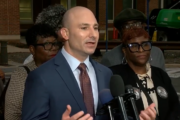Doctors come from diverse backgrounds and opinions yet share several characteristics: strong communication skills, presence, critical thinking, compassion and resilience. Though expressed uniquely by each individual physician, these are requisite parts of the practice of medicine.
Prospective medical school students should consider developing these same traits while undergraduates.
Strong Communication Skills
Medicine depends on the communication of ideas, concepts and orders. Not only do doctors communicate verbally, but also through their body language, patient charting, order writing and how they respond to certain situations.
In addition, doctors communicate across the spectrum of people — from patients to nursing staff and other doctors — and must learn to discuss critical information with all sorts of audiences.
Speaking with the correct tone, idiom and language is integral. It’s important for a physician to know his or her audience and speak to that appropriate level. Also, compassion and attentiveness are crucial to engage the other party and to effectively communicate ideas and instructions.
[Read: 4 Skills Every Premed Student Should Develop Before Medical School]
Be aware of how you communicate. Are you engaged? Are you rigid or distant? Do you explain things at an appropriate level? Enhance your communication skills through participation in speech courses, class presentations and undergraduate organizations.
Presence
This trait is key when effectively speaking to colleagues and patients. Concentrate on what the person is saying instead of thinking about how you are going to respond.
This especially comes into play when meeting with patients and knowing that you will have to document your encounter or that you may be running behind in your schedule. Each patient deserves your time, and it’s important to always respect what they tell you.
Be present by focusing attention on the other individual when talking in person or by telephone. This means no emailing, texting others or wandering off in thought as you converse. Being present nonverbally communicates you are there with them while focusing your attention and intellect on the issue at hand.
Critical Thinking
Regardless of their specialty, doctors assess volumes of data to quickly form a working conclusion, using deductive reasoning and inferences based on knowledge and experience.
No two patients are the same. Although their treatments may be similar, each patient must be evaluated individually. If not, potentially fatal errors can occur.
Often, physicians must rapidly synthesize information to formulate a plan that can be quickly put into place. Though this skill is mastered during med school and residency, you can begin to build the foundation as an undergrad.
Undergraduate courses in humanities and the sciences foster critical thinking skills. It’s the critical thinker’s appropriate application of knowledge that distinguishes “smart” from “brilliant” and creates a great clinician or diagnostician.
[READ: 6 Ways Nonscience Courses Can Prepare Students for Medical School]
Compassion
Compassion is more than kindness and civility; it is an authentic sympathy for self, patients, colleagues and co-workers irrespective of race, class, creed or personal behavior. Patients seek a physician’s counsel for warmth and understanding, not merely medical expertise.
Having a good “bedside manner” is effectively being compassionate and showing genuine concern for your patients.
Most people who gravitate toward medicine do so because of inherent compassion for others. However, it is still something that needs fostering and developing.
Watch your mentors in your volunteer work and emulate the compassion they show. Consider working with marginalized populations to develop compassion and empathy toward others in varying circumstances.
Resilience
Becoming and being a doctor is hard. You’re faced with rejection, an endless task list and difficult hurdles to just be accepted to medical school. Then in med school and beyond, the stakes are even higher.
Resilience is what gets you through those moments when seemingly everything has gone wrong. For a successful career and life, discover healthy coping mechanisms that work best for you to perform optimally.
[Read: Professionalism in Medicine — What Every Aspiring Physician Should Know]
This may include daily exercise, such as taking a long run, swimming a few laps in the pool or practicing martial arts. Perhaps it’s writing poetry, journaling, practicing religion, meditating or going for a long drive to cope with the vicissitudes of life.
Balancing classes, volunteer work, intramural athletics and extracurricular activities with everyday life helps to shape and hone your resilience, allowing you to see more of the beauty in life.
In all, developing character along with learning scientific and technical knowledge creates a well-informed and balanced physician. Start building these skills now, and you will have an easier time transitioning to the practice of medicine as a medical student and future doctor.
More from U.S. News
How to Document Premed Activities
How Hospital Administration Projects Can Benefit Premed Students
Changing to a Premed Track: Things to Know
5 Key Characteristics of Successful Medical School Applicants originally appeared on usnews.com







